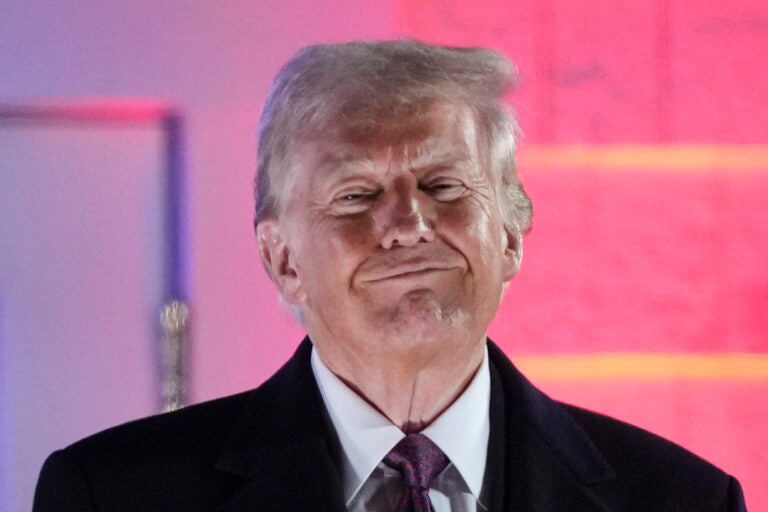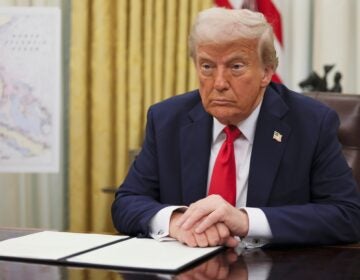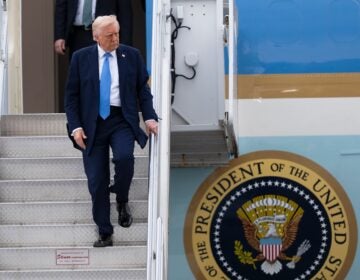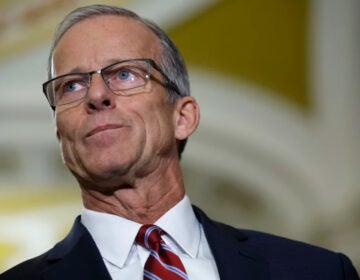Trump’s 2nd term represents hope for the right and fear of a dark era for others
Loyalists are lined up to help push an economic and social agenda that is sure to hearten his supporters and fuel an even deeper disdain among his detractors.

President-elect Donald Trump smiles after a fireworks show at Trump National Golf Club in Sterling, Va., Saturday, Jan. 18, 2025, ahead of the 60th Presidential Inauguration. (AP Photo/Matt Rourke)
For the second time, Donald Trump will be inaugurated Monday as president of the United States.
It represents a pivotal time in American history, a new period beyond the world order created by the United States and its allies post-World War II.
For the right, it presents hope for a future of a country returning to conservative social values and prioritizing the economic well-being of American citizens. But for millions of others on the left, Trump’s return is the dawning of a dark era — one more nativist, inward-looking and mean-spirited that could leave the marginalized more vulnerable than ever.
Trump is better-equipped to enact his agenda than when he first won the White House in 2016. Loyalists are lined up to help push an economic and social agenda that is sure to hearten his supporters and fuel an even deeper disdain among his detractors.
Here are the areas that the president-elect is expected to prioritize.
Restore his reputation
If there is one thing that has grated on Trump in business or politics, it’s being branded a “loser.”
So after his 2020 election loss, he searched for an off-ramp to explain it away. He found it by suggesting falsely that he actually won.
Many Republicans appeared ready to abandon Trump after he inspired the Jan. 6, 2021, siege of the U.S. Capitol — an effort to overturn the legitimate election results. But, as the months went on and Trump’s continued strength with the Republican base became clearer, Republican leaders, one by one, gravitated back.
He had a social media and MAGA podcast army at his back as legacy media became less relevant — and more of a perceived nuisance.
Trump used the criminal cases against him and growing public frustration over immigration to consolidate the support of his base, while inflation created an environment that could help a Republican take the presidency back.
It’s a remarkable twist of fate, given Trump’s low approval ratings when he left office amid the COVID pandemic. And yet, even though the pandemic barely came up during the 2024 presidential campaign, it was a big reason why Trump wound up winning.
Americans largely disapproved of the way Trump handled the pandemic, but because of the supply-chain shortages it created, it is largely the reason for inflation going as high as it did.
In survey after survey, Americans said inflation and prices were their biggest concern during the campaign — as the pandemic receded from the forefront.
Fix the economy
The country’s central bank, the Federal Reserve, increased interest rates throughout the Biden administration as a way to decrease the rate of pandemic-associated inflation. That has made an impact on inflation, but things like mortgage rates and auto loans also went up. So not only did eggs cost more, but so did houses and cars.
Unemployment remained low, wages increased and the United States wound up recovering better than most other developed countries throughout President Biden’s term. But macroeconomics — and a message of, “We’re doing better than most other countries” — was a hard sell for the Democrats when groceries were more expensive than people were comfortable with.
Many Americans felt a degree of nostalgia for the pre-pandemic economy when Trump was president, when prices and interest rates were lower.
The latest NPR/PBS News/Marist poll found that 6-in-10 people said the economy is not working well for them. Just before the pandemic, though, two-thirds said it was.
That’s a big mood swing, and Trump used Americans’ economic uneasiness to pave his path back to White House — with promises of fixing it. He appeared under banners that read, “Make America Wealthy Again” and “Jobs! Jobs! Jobs!”
But since Trump’s election, he has admitted that bringing down prices will be “hard.”
It was always reductive to believe that by simply putting Trump back in office, prices and interest rates would suddenly come down, especially when any president has so little control over the economy.
Yet optimism is high — 44% in the NPR poll said that they believe their family’s financial situation will get better over the next year. That’s the highest in 15 years of asking the question by NPR polling partner Marist. Just 22% said they think it will get worse.
That could mean high expectations, but Trump is inheriting a fairly strong economy that’s already headed in the right direction. So, ironically, views of the economy may improve without Trump needing to do much of anything. And if that happens, Trump will likely get credit.
Views of the economy — and Trump’s presidency more broadly — could determine which party controls the White House four years from now, as Trump is limited to just four more years.
Cut spending and reduce the debt
As unusual as Trump is in American politics and despite how much he’s upended political norms and GOP dogma, much of his economic policy agenda is very much rooted in a traditional Republican playbook: cut income taxes broadly (his cuts in 2017 were projected to benefit the wealthy the most), further deregulate industry and expand oil exploration and drilling.
Republicans say they want to slash the federal debt, which now sits at more than $36 trillion. But extending Trump’s past tax cuts without further growing revenue would add almost $5 trillion to the federal debt, according to the Congressional Budget Office.
Despite that, Trump’s Treasury Secretary-nominee Scott Bessent, a billionaire hedge-fund manager, claimed it would be an economic “calamity” if the cuts are not extended, disagreed that ending the cuts — even for the wealthiest — would help pay down the national debt, and he is against raising taxes even on billionaires.
“I think that these are the job creators,” he said in response to Sen. Raphael Warnock’s, D-Ga., line of questioning during his confirmation hearing this past week.
House Speaker Mike Johnson, R-La., told reporters earlier this month that Trump does not want Social Security and Medicare — a huge driver of spending — cut.
“No, the president has made clear that Social Security and Medicare have to be preserved,” Johnson said.
Entitlements — which include programs like Social Security — make up more than half the federal budget and are incredibly popular. The other massive chunk is defense spending, but an even larger defense budget is expected under Trump.
Elon Musk, the world’s richest man, who boosted Trump’s election efforts to the tune of more than $250 million, is aiming to slash some $2 trillion through his informal effort with former tech CEO Vivek Ramaswamy to identify cuts at every level of government. They’ve declared their endeavor the Department of Government Efficiency, or DOGE.
The entirety of all discretionary, non-defense domestic spending totals less than a trillion dollars — making it hard to know where those cuts would come from.
Musk himself has already cast doubt on being able to cut that much.
Trying to make up some revenue, Trump has stepped outside GOP orthodoxy, touting tariffs — a tax on foreign goods paid by the Americans importing them — as a budgetary panacea. Many economists disagree and believe they would damage the U.S. economy and cost consumers.
Americans also don’t appear to be buying Trump’s tariffs narrative. The NPR poll found, by a 48%-31% margin, respondents thought tariffs would do more to hurt than help the economy.
Trump’s tax-cut, deregulation and drilling agenda will more than likely make money for the wealthy and big businesses, but the national debt will almost certainly increase again.
The debt went up about $8 trillion during Trump’s first term, but he’s banking on a broad tax-cuts extension pacifying cash-strapped Americans, while he also pushes forward with the heart of what’s fueled his populist political rise — social and cultural issues, as well as grievance politics.
Address illegal immigration, ending ‘woke’ and pardoning supporters
Trump is expected to aggressively pursue mass deportations of those in the U.S. without legal status soon after he’s inaugurated.
The number of migrants crossing the U.S.-Mexico border was often at record highs during the Biden administration, though it came down rapidly in 2024, and some cities struggled to cope with the number of migrants arriving.
Trump is also likely to go after diversity, equity and inclusion initiatives, push to make curriculum in schools more conservative and try to change Title IX protections to exclude transgender students, potentially affecting everything from respect for pronouns to which bathrooms and locker rooms transgender students can use.
The incoming president is also pledging retribution against those he sees as political enemies. He has pledged to pardon many, if not all, of those involved in the Jan. 6 insurrection, and he’s threatened to go after people he believes have wronged him, from journalists to the political class and prosecutors.
The president-elect’s pick for attorney general, Pam Bondi, said at her hearing last week that she will not let the Justice Department be politicized. The country will find out soon enough how she’ll run the department.
Americans, though, don’t seem convinced about all of Trump’s policies. The NPR poll found people were split on mass deportations, and more than 6 in 10 opposed pardoning those involved with Jan. 6.
A new relationship with the corporate class
Corporations appear to be taking Trump’s threats seriously and are trying hard to get in his good graces — from CEOs meeting with him at Mar-a-Lago to tech billionaires like Musk, Amazon’s Jeff Bezos and Meta’s Mark Zuckerberg all expected to be at Trump’s inauguration.
It’s not new for America, though, to have billionaires at the ball. Take this from the library of former President Chester Arthur on the inauguration of 1881:
“The attendees included most Republican Stalwart luminaries of the day, and a who’s who of the business establishment and ‘billionaires’ of the day, including Jay Gould, J. Pierpont Morgan, and John Jacob Astor. Former President Grant was seated at the head of the center table, flanked by Dorsey on one side, and Arthur on the other, in a lavishly decorated private dining hall.”
Despite that precedent, President Biden warned that something dangerous is afoot. In his farewell address last week, Biden described a growing “Tech Industrial Complex” and a new rising American “oligarchy.”
Trump has claimed that he has an “unprecedented and powerful mandate.” That’s hard to do when a candidate doesn’t win a majority of the popular vote, but presidents often overread their electoral mandates and wind up overreaching and losing popular support. After all, people don’t vote for a president’s entire agenda. It’s far more complicated than that.
Monday, Trump’s second inaugural address will give the first clues about what he will prioritize, and mark the beginning of what comes next politically in this country and opening the question of who will emerge to lead it beyond the Trump era.

Get daily updates from WHYY News!
WHYY is your source for fact-based, in-depth journalism and information. As a nonprofit organization, we rely on financial support from readers like you. Please give today.






